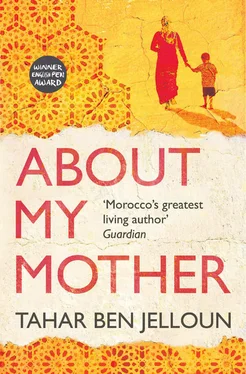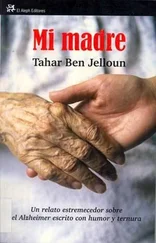My older brother comes to see her twice a week, in the late afternoon. He’s very affectionate. As she says, ‘He covers me in kisses.’ Since he’s also unwell, he’s careful about his health. He discusses his aches and pains with her, his difficulties with his children. She listens and doesn’t judge him. He’s a delicate, cultured man, a good Muslim, moderate, with a horror of fanaticism and fundamentalism of any kind. A very sensitive man, he’s retreated from life. My mother would rather he hadn’t, but she doesn’t say anything. She’d have loved to see him happy, generous, open and less anxious. But she finds his presence comforting. Even though she gets him muddled up with me or my other brother. Then she corrects herself and apologises. She knows it hurts us. But no one holds it against her. We all know that her illness plays tricks on her. When she’s lucid, she sets the record straight: ‘Don’t go thinking I’ve gone mad! It’s all the pills I’ve been taking for over thirty years that have damaged my mind. Add it up: about ten pills a day for thirty years, how many is that? A tonne? Two tonnes? Enough to kill an army! So if I get things wrong, if I don’t recognise you straight away, don’t be angry with me. It’s that wretched medicine that’s to blame. The pills have saved me, but at the same time, they’ve destroyed something inside me.’
When she was in the hospital, with death prowling her room, a cousin suggested taking her back home: ‘It would be better for her to pass away in her own house.’ The comment reminded me of one of her wishes: ‘If I die away from home, please don’t make me spend the night in the fridge.’ My father had died in the afternoon and spent the night in the morgue. It wasn’t until eight o’clock the next morning that the ambulance brought his body back to the house. That cold night had broken my mother’s heart. She’d talk about it often. I once tried to tell her that death is the absence of all feeling, but she was adamant that her body, even if devoid of sensation, must not spend the night in the fridge. When we told her that Father had died, she had this strange reaction: ‘But where is he?’ My brother said: ‘At the hospital, in the morgue.’ ‘You mean in the fridge?’ ‘Yes, in the fridge, that’s the way it’s done.’ She didn’t sleep at all that night. She dressed in white, picked up her beads and began to pray. All night long, she must have been thinking about her husband. I’d even venture that she’d never thought about him as she did that night. She must have identified with him, felt the cold he was unable to feel. She put herself in his place, in that glacial chamber, shivering constantly and feeling sick. Death isn’t only the absence of feeling, it’s also the thought of nothingness, of what’s no longer there, of what’s inevitably approaching. Since that night, she’s had a horror of being put in the fridge.
She was barely sixteen when she fell pregnant. Sidi Mohammed learned it from his mother, who summoned him to break the good news: ‘Lalla Fatma is expecting a baby. May God grant it’s a boy, but I’ll be just as happy with a girl, even though your older brother only has daughters. I can’t wait to see your son. Lalla Fatma shows excellent promise — may God protect her and ease the ordeal of pregnancy — she has nothing but good qualities, and she makes delicious tagines. Are you happy, my son?’ ‘Yes, Mother, I’m very happy. She really is a girl from a good family. Parents such as hers are exceptional.’
In her seventh month of pregnancy, Sidi Mohammed fell ill. His complexion looked sallow, he lost weight, and often had a raging fever. He no longer went out. The nurse, Drissi, came to his bedside, and was unable to hide his despondency: ‘He is in God’s hands. It’s a scourge afflicting our country. I hope I’m wrong. I’ve given him a nice, strong injection to make him sleep. Don’t wake him. I’ll see you tomorrow. God is merciful!’
My mother cried. The entire family was with him. When Sidi Mohammed awoke, he looked dazed, his eyes were glassy and he had difficulty speaking. The worst of it was that, several times a day, lamentations for the dead rang out as funeral processions passed by. The typhus epidemic had spread. Drissi worked without pause. Another nurse, Skalli, went from house to house handing out white pills. The corpse washers were busy day and night.
Drissi advised that Lalla Fatma should be kept away from Sidi Mohammed until the birth. My mother refused to leave her husband, or her home. Lalla Radhia, the midwife, insisted she follow her. Touria was born just as her father breathed his last: he never set eyes on her. My mother cried throughout. Someone even dared say that she’d brought bad luck. My mother didn’t leave her parents’ house. It was her mother who looked after Touria for those first months, she nursed her alongside my mother’s baby sister.
Sidi Mohammed was buried in El Guebeb cemetery. He was just twenty-one years old. My mother visited his grave every Friday and spoke to him: ‘Touria looks just like you, she has your eyes, your skin, and your gentleness. It was God’s will, there’s nothing we can do! I pray every day that you’re on the way to paradise, that you forgive me if, in a moment of distraction, I failed in my duty. Now I pray to God each day that your child will grow up in good health and in joy. I’ll make an offering to Moulay Idriss, so our Prophet’s companions will welcome you as you deserve! Thanks be to God!’
‘I’m not afraid of death,’ she likes to repeat. ‘Death is a right that God bestows. I’m not talking about divine will. And illness is another thing. It’s death that’s the coward. It stalks us, goes for one part of our body, tortures it, takes away its natural function, then travels round, takes on another part, savages it, makes it suffer, and in the end attacks the mind. I’m not afraid of death, but of seeing my suffering reflected in your eyes; it’s seeing you overcome with grief because I’m suffering, eaten up from the inside. That I can’t bear. I believe, I surrender to God and I’m glad He’s calling me to Him. But I have one wish: for you all to be there, and for you not to suffer.’
My mother’s never heard of homes where old people are parked. She couldn’t imagine for a second that one of her children might throw her out, exile her somewhere. Whether it’s called ‘home’, ‘hospice’, ‘rest home’ or ‘retirement home’, it’s a dumping ground. I was very moved by a Japanese film I saw, in which an old man is carried to the top of a snow-covered mountain to hasten his death. I think it’s a tradition that derives from excessive pride on the part of the elderly, who are loath to be a burden to their offspring. They cry out for this exile among birds of prey. They’re left on the mountainside and everyone goes home, slightly relieved and slightly sad. In a country where suicide is common, where people have a strong sense of honour, the elderly preempt what’s coming, and their children’s meanness: they go before they’re unwanted. The idea’s quite appealing in theory, but when it comes to the act, it’s monstrous — a form of euthanasia, but more perverse. As soon as a person’s no longer productive or becomes mentally incapacitated, they must make way for the younger generation.
In Morocco, besides the love of God, we’re taught an almost religious reverence for our parents. The worst thing that can happen to someone is that their parents disown them. To refuse to give a child your blessing is to exile them to a place without mercy — to abandon them, discard them like a worthless object. It’s to withdraw all trust and, worst of all, to close the door of your house to them, the door to life and hope. It’s the most severe humiliation and isolation. We live in fear of one day being denied our parents’ blessing. This blessing is a reassuring symbol, a soothing tradition. We owe our parents this submission, which in the west might seem ridiculous, or psychologically unacceptable. I’ve always kissed my father’s and my mother’s right hand. I’ve never dared smoke in front of them, never shouted or sworn. It’s the way we’re brought up, the way we are with those we love. That doesn’t mean there are no problems or arguments, but we cultivate love above all. On our parents’ side, that love can be all-consuming and possessive, it can be irritating and stifling. But that does not justify a fundamental lack of respect, a respect that involves affection, an almost irrational surrender. That’s what filial love is, a bond that can’t be quantified. You accept it as life’s gift and do your utmost to be worthy and proud of it.
Читать дальше












